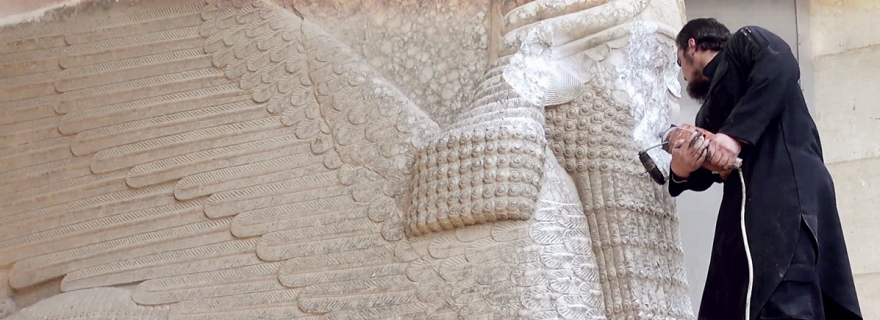Shattering Ignorance
“Demolish! Demolish! the state of idols,” repeats the nashid that accompanies images of destruction in an ISIS video from Iraq’s Mosul Museum. What is the idea behind attacking antiquities belonging to ancient kingdoms?
Whose sovereignty was ISIS targeting? The spokesman of the February 2015 video somewhat inaccurately identifies the images under attack as having belonged to “the Assyrians, Akkadians, and others.” The notion of jahiliyya may clarify the rationale behind attacking the images of these long defunct regimes.
The jahiliyya or “Age of Ignorance” refers, most narrowly, to the century or so of Arabian history that predates the arrival of Muhammad. The era is best remembered for its highly stylized poetry celebrating the virtues of kin, lampooning enemies, recalling lost loves, and lamenting the dead.
In the Qur’an, jahiliyya refers to the local Arab culture that Muhammad has come to reform. With time, the term’s meaning expanded to include the epoch before the establishment of Islam. In this sense, as peoples of the pre-Islamic past “the Assyrians, Akkadians, and others” belong to the period of jahiliyya.
The term’s meaning has broadened in other ways too. The philosopher al-Farabi (872-950) used it to refer to any regime that falls short of the virtuous city—regardless of its chronological place in history. Thinkers like Ibn Taymiyya (1263-1328) and Ibn ‘Abd al-Wahhab (1703-92) used the term to censure what they saw as the persistence of pre-Islamic customs among the Muslims of their own day.
In modern times, the reformers Muhammad ‘Abduh (1849-1905) and Rashid Rida (1865-1935) also compared aspects of contemporary Muslim life with aspects of jahili society. A. Yusuf ‘Ali (d. 1953), in a gloss on the word jahiliyya in his English translation of the Qur’an, comments, “The Days of Ignorance were the days of tribalism, feuds, and selfish accentuation of differences in man. Those days are not really yet over. It is the mission of Islam to take us away from that false mental attitude.”
In the 1960s, Muslim Brotherhood theorist Sayyid Qutb (1906-66), whose writings remain influential in radical circles to this day, popularized the term jahiliyya in his attempt to articulate what is wrong with modern life. Born in a village in Upper Egypt, Qutb actively participated in Cairo’s literary scene from the mid-1920s through the early-1950s.
As the story goes, repulsed by the loose mores he witnessed while on a government-sponsored study trip in the United States, Qutb began to develop the hardline brand of Islam for which he is best known. On his return to Egypt, Qutb joined the Muslim Brotherhood and became a fierce critic of the Egyptian government and the lingering influence of the imperial powers despite the country’s nominal independence.
After a failed attempt on Nasser’s life in 1954, the Muslim Brotherhood was banned and Qutb imprisoned. He spent most of the rest of his life in jail, where he wrote a massive Quranic commentary called In the Shade of the Qur’an; his best-known book, Milestones, a call for Islamic revolution; and numerous other works. In August 1966 he was executed for plotting against the Egyptian government.
Qutb gives jahiliyya a central place in his more radical later writings. A society that fails to follow God’s guidance in all areas of life, he argues, is jahili and engaged in the usurpation of God’s sovereignty. Jahili societies are man-made imposter sovereignties—whether they take the form of tribes, clans, kingdoms, empires, or, as today, nation-states.
“The true character of Islam,” by contrast, he writes in Milestones, “is a universal proclamation of the freedom of man from servitude to other men, the establishment of the sovereignty of God and His Lordship throughout the world, the end of man’s arrogance and selfishness, and the implementation of the divine law in human affairs.” In his commentary on the Qur’an, Qutb elaborates:
"Jahiliyya—as God describes it and His Qur’an defines it—is the rule of humans by humans because it involves making some humans servants of others, rebelling against service to God, rejecting God’s divinity and, in view of this rejection, ascribing divinity to some humans and serving them apart from God. Jahiliyya—in the light of this text—is not a period of time but a condition, a condition which existed yesterday, exists today, and will exist tomorrow."
Qutb’s influential notion of jahiliyya helps explain why the destruction of images belonging to ancient kingdoms can be translated into an attack on modern political regimes. Strewn on a museum’s floor, these shattered sculptures bear witness to both ancient and modern ignorance.
Aaron Tugendhaft will deliver a lecture entitled The Idols of ISIS on Tuesday 6 September 2016. This lecture is organised by LUCIS, NINO and the Ancient Worlds Network Leiden. Visit the website of LUCIS for more information.



0 Comments